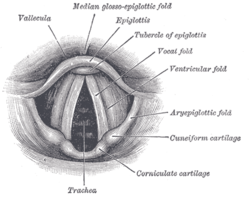Aryepiglottic fold
| Aryepiglottic fold | |
|---|---|
 The entrance to the larynx, viewed from behind (aryepiglottic fold labeled at center right) | |
 Laryngoscopic view of interior of larynx (aryepiglottic fold labeled at center right) | |
| Details | |
| System | Larynx |
| Identifiers | |
| Latin | plica aryepiglottica |
| TA98 | A06.2.09.003 |
| TA2 | 3193 |
| FMA | 55448 |
| Anatomical terminology [edit on Wikidata] | |
The aryepiglottic folds are triangular folds of mucous membrane of the larynx. They enclose ligamentous and muscular fibres. They extend from the lateral borders of the epiglottis to the arytenoid cartilages, hence the name 'aryepiglottic'. They contain the aryepiglottic muscles and form the upper borders of the quadrangular membrane. They have a role in growling as a form of phonation. They may be narrowed and cause stridor, or be shortened and cause laryngomalacia.
Structure
The aryepiglottic folds are triangular. They are narrow in front, wide behind, and slope obliquely downward and backward. They originate from the lateral borders of the epiglottis.[1] They insert into the arytenoid cartilages.[1]
In front, they are bounded by the epiglottis. Behind, they are bounded by the apices of the arytenoid cartilages, the corniculate cartilages, and the interarytenoid notch.[2] Within the posterior part of each aryepiglottic fold exists a cuneiform cartilage which forms a whitish prominence, the cuneiform tubercle.
The aryepiglottic folds contain the aryepiglottic muscles. They form the upper borders of the quadrangular membrane, and the lateral borders of the laryngeal inlet.[1]
Function
- Phonation
Under certain circumstances, the aryepiglottic folds take part in phonation, for instance in the singing technique of vocal growl, such as practiced by Louis Armstrong and other jazz singers. The approximation of the aryepiglottic folds during vocalization may establish sustained co-oscillations, at relatively low frequencies, producing the growl or growling effect.[3]
Clinical significance
- Stridor
If the aryepiglottic folds narrow the laryngeal inlet, they may cause stridor.[1][4]
- Laryngomalacia
The aryepiglottic folds are shortened in laryngomalacia.[5] They may be surgically removed to prevent problems eating and shortness of breath.[5]
Gallery
-
Aryepiglottic fold
-
Aryepiglottic fold
-
Aryepiglottic fold
-
Aryepiglottic fold
-
Deep dissection of larynx, pharynx and tongue seen from behind
References
![]() This article incorporates text in the public domain from page 1079 of the 20th edition of Gray's Anatomy (1918)
This article incorporates text in the public domain from page 1079 of the 20th edition of Gray's Anatomy (1918)
- ^ a b c d Reidenbach, Martina Maria (1998). "Aryepiglottic fold: Normal topography and clinical implications". Clinical Anatomy. 11 (4): 223–235. doi:10.1002/(SICI)1098-2353(1998)11:4<223::AID-CA1>3.0.CO;2-S. ISSN 1098-2353. PMID 9652536.
- ^ Olesiak, Doctor (2023-07-23). "An Overview Of Throat Anatomy". Retrieved 2023-07-29.
- ^ Sakakibara, Ken-Ichi; Fuks, Leonardo; Imagawa, Hiroshi; Tayama, Niro (2004). "Growl Voice in Ethnic and Pop Styles" (PDF). Proceedings of the International Symposium on Musical Acoustics. Retrieved 19 June 2013.
- ^ Peron, Didier L.; Graffino, Donatella B.; Zenker, David O. (1988). "The redundant aryepiglottic fold: Report of a new cause of stridor". The Laryngoscope. 98 (6): 659–663. doi:10.1288/00005537-198806000-00016. ISSN 1531-4995. PMID 3374242.
- ^ a b Polonovski, Jean-Michel; Contencin, Philippe; Francois, Martine; Viala, Paul; Narcy, Philippe (1990-08-01). "Aryepiglottic Fold Excision for the Treatment of Severe Laryngomalacia". Annals of Otology, Rhinology & Laryngology. 99 (8): 625–627. doi:10.1177/000348949009900807. ISSN 0003-4894. PMID 2382935.
Bibliography
- Hals-Nasen-Ohren-Heilkunde, 12. Auflage, 2005, S.239–45. ISBN 978-3-540-21969-9 (in German)
- Schuhmacher GH, Aumüller G, Topographische Anatomie des Menschen, Elsevier, 2004, ISBN 3-437-41367-8 (in German)
External links
- Anatomy photo:31:17-0104 at the SUNY Downstate Medical Center
- Atlas image: rsa3p10 at the University of Michigan Health System
- lesson11 at The Anatomy Lesson by Wesley Norman (Georgetown University) (larynxsagsect)




